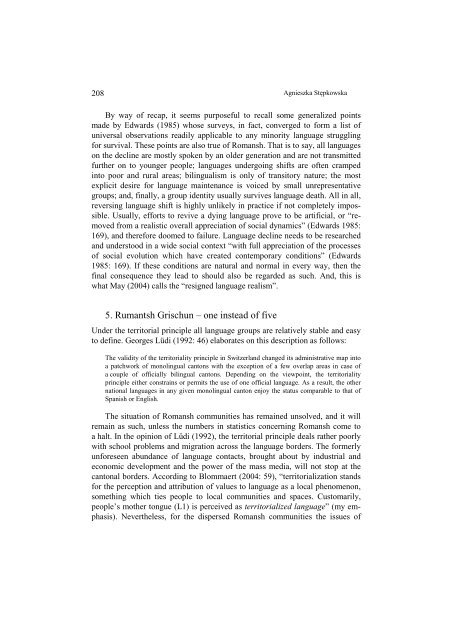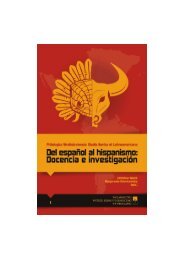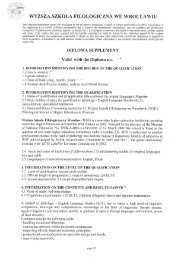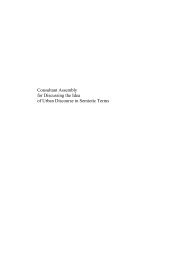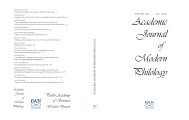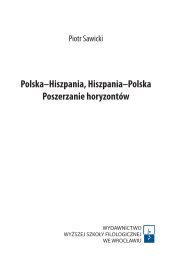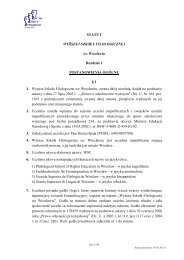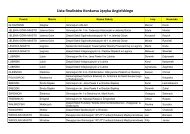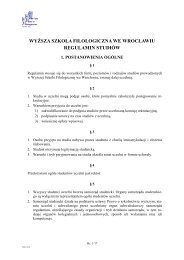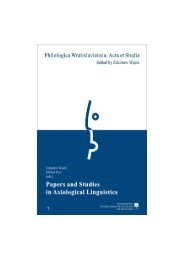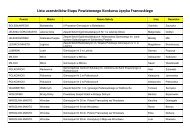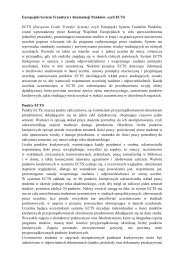s - Wyższa SzkoÅa Filologiczna we WrocÅawiu
s - Wyższa SzkoÅa Filologiczna we WrocÅawiu
s - Wyższa SzkoÅa Filologiczna we WrocÅawiu
Create successful ePaper yourself
Turn your PDF publications into a flip-book with our unique Google optimized e-Paper software.
208<br />
Agnieszka Stępkowska<br />
By way of recap, it seems purposeful to recall some generalized points<br />
made by Edwards (1985) whose surveys, in fact, converged to form a list of<br />
universal observations readily applicable to any minority language struggling<br />
for survival. These points are also true of Romansh. That is to say, all languages<br />
on the decline are mostly spoken by an older generation and are not transmitted<br />
further on to younger people; languages undergoing shifts are often cramped<br />
into poor and rural areas; bilingualism is only of transitory nature; the most<br />
explicit desire for language maintenance is voiced by small unrepresentative<br />
groups; and, finally, a group identity usually survives language death. All in all,<br />
reversing language shift is highly unlikely in practice if not completely impossible.<br />
Usually, efforts to revive a dying language prove to be artificial, or “removed<br />
from a realistic overall appreciation of social dynamics” (Edwards 1985:<br />
169), and therefore doomed to failure. Language decline needs to be researched<br />
and understood in a wide social context “with full appreciation of the processes<br />
of social evolution which have created contemporary conditions” (Edwards<br />
1985: 169). If these conditions are natural and normal in every way, then the<br />
final consequence they lead to should also be regarded as such. And, this is<br />
what May (2004) calls the “resigned language realism”.<br />
5. Rumantsh Grischun – one instead of five<br />
Under the territorial principle all language groups are relatively stable and easy<br />
to define. Georges Lüdi (1992: 46) elaborates on this description as follows:<br />
The validity of the territoriality principle in Switzerland changed its administrative map into<br />
a patchwork of monolingual cantons with the exception of a few overlap areas in case of<br />
a couple of officially bilingual cantons. Depending on the viewpoint, the territoriality<br />
principle either constrains or permits the use of one official language. As a result, the other<br />
national languages in any given monolingual canton enjoy the status comparable to that of<br />
Spanish or English.<br />
The situation of Romansh communities has remained unsolved, and it will<br />
remain as such, unless the numbers in statistics concerning Romansh come to<br />
a halt. In the opinion of Lüdi (1992), the territorial principle deals rather poorly<br />
with school problems and migration across the language borders. The formerly<br />
unforeseen abundance of language contacts, brought about by industrial and<br />
economic development and the po<strong>we</strong>r of the mass media, will not stop at the<br />
cantonal borders. According to Blommaert (2004: 59), “territorialization stands<br />
for the perception and attribution of values to language as a local phenomenon,<br />
something which ties people to local communities and spaces. Customarily,<br />
people’s mother tongue (L1) is perceived as territorialized language” (my emphasis).<br />
Nevertheless, for the dispersed Romansh communities the issues of


